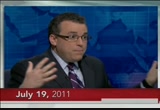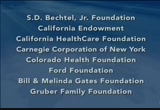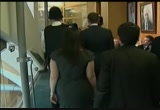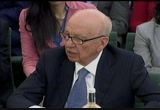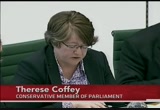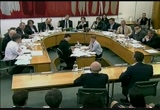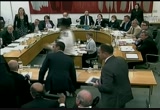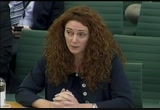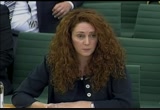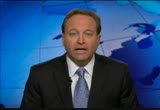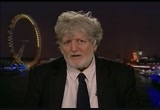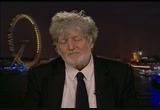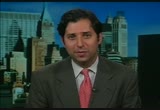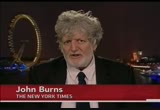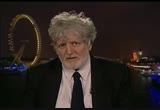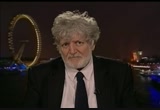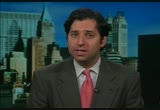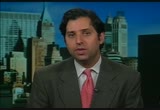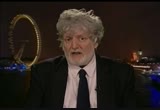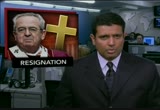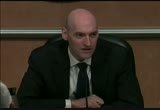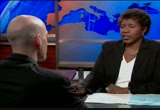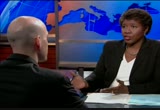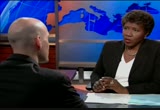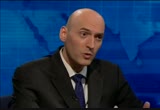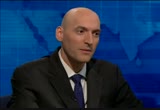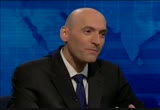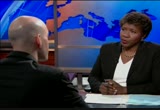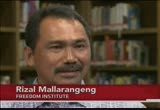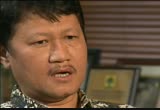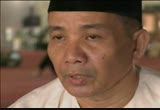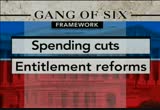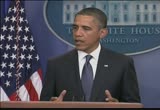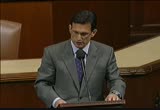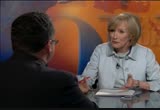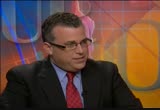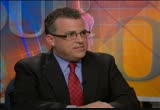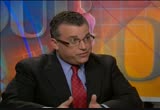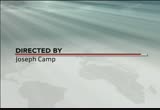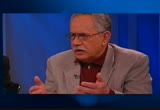tv PBS News Hour PBS July 19, 2011 6:00pm-7:00pm EDT
6:00 pm
captioning sponsored by macneil/lehrer productions >> this is the most humble day of my life. >> brown: there was high drama in london today at the parliamentary hearings on the phone hacking scandal, including an attack on media mogul rupert murdoch by a prankster armed with a plate of shaving cream. good evening. i'm jeffrey brown. >> ifill: and i'm gwen ifill. on the newshour tonight, we examine today's proceedings where the head of news corp said he was shocked, appalled and ashamed, but not responsible for the misdeeds.
6:01 pm
we talk to john burns of "the new york times" and david folkenflik of npr. >> brown: then, we ask nuclear regulatory commission chair gregory jaczko if u.s. reactors could withstand an earthquake like the one that devastated japan. >> ifill: from indonesia, ray suarez reports on the challenges and the troubles facing one of the world's largest democracies. >> it made tremendous strides politically and economically but still struggles with corruption. >> brown: kwame holman updates the budget battles as the house and senate offer dueling plans for reducing the deficit. >> ifill: and judy woodruff explores the deadline-driven deal cutting underway with political editor david chalian. >> brown: plus, in a season of tornadoes, floods and more, we get some poetic perspective on the beauty and power of nature. that's all ahead on tonight's newshour. major funding for the pbs newshour has been provided by: >> okay, listen. somebody has got to get serious. >> i think... >> we need renewable energy.
6:02 pm
>> ...renewable energy is vital to our planet. >> you hear about alternatives, right? wind, solar, algae. >> i think it's got to work on a big scale. and i think it's got to be affordable. >> so, where are they? >> it has to work in the real world. at chevron, we're investing millions in solar and biofuel technology to make it work. >> we've got to get on this now. >> right now. and the william and flora hewlett foundation, working to solve social and environmental problems at home and around the world. and with the ongoing support of these institutions and foundations. and... this program was made possible by the corporation for public broadcasting. and by contributions to your pbs station from viewers like you. thank you. >> brown: the firestorm over phone hacking in britain put media magnate rupert murdoch on the hot seat today before a committee of parliament.
6:03 pm
along with his son and a former top executive, murdoch faced close questioning, and a closer encounter with a pie plate. outside, the sidewalks were crowded with protesters against the murdochs and their newspapers, and british prime minister david cameron. inside, rupert murdoch was confronted by british lawmakers over allegations that his tabloids hacked the phones of celebrities, royals, slain soldiers, and murder victims. at the outset, he and son james, the current c.e.o. of news corporation, set a tone of contrition. >> these actions don't live up to the standards our company aspires to everywhere around the world. and it is our determination to put things right, make sure this doesn't happen again, and to be the company that i know we've always aspired to be.
6:04 pm
as for my comments, mr. chairman, and my statement, which i believe was around the closure of "the news of the world newspaper" >> brown: the long-simmering scandal at murdoch's "news of the world" exploded two weeks ago with revelations that the voicemails of milly dowler, a teenage murder victim, had been illegally intercepted by reporters. >> i was absolutely shocked, appalled and ashamed when i heard about the milly dowler case only two weeks ago, eight days before i saw them and was graciously received by the dowlers. >> brown: murdoch apologized to the dowler family in person last friday. but when asked to accept direct blame today, he demurred. >> mr. murdoch, you accept that, ultimately, you are responsible for this whole fiasco? >> no. >> you are not responsible? who is responsible?
6:05 pm
>> the people that i trusted to run it, and then maybe the people they trusted. >> brown: murdoch suggested he paid little attention to "the news of the world" because it amounted to less than 1% of his holdings, which include, in the u.s., fox broadcasting, "the wall street journal," and the "new york post". james murdoch also said repeatedly that he knew nothing about key aspects of the scandal, such as how informants were paid. >> i don't have direct knowledge of all of those arrangements. >> is it possible other forms of remuneration can be used in your company, apart from cash and bank transfers-- talking things like travelers checks, vouchers, things that can be redeemed for cash? >> i don't have knowledge of that. >> brown: that led to this line of questioning from member of parliament adrian sanders. >> finally, are you familiar with term "willful blindness?" >> uh... mr. sanders, would you care to elaborate? >> it is a term that came up in the enron scandal. "willful blindness" is a legal term.
6:06 pm
it states that if there is knowledge that you could have had and should have had but chose not to have, you are still responsible. >> mr. sanders, do you have a question? respectfully, i don't know what you'd like me to say. i'm not aware of that particular phrase. >> but now, you are familiar with the term because i've explained it to you. >> i've heard the phrase before and we were not ever guilty of that. >> brown: the elder murdoch also took on the question of whether the families of 9/11 victims were subject to phone hacking in the u.s. >> we have seen no evidence of that at all. as far as we know, the fbi haven't, either. if they do, we will treat it exactly the same way as we treat it here. i cannot believe it happened from anyone in america. >> brown: m.p.s focused, as well, on the growing political
6:07 pm
dimensions of the scandal, and the murdochs' ties to political power, especially prime minister david cameron. >> why did you enter the back door at number ten when you visited the prime minister following the last general election? >> because i was asked to. >> you were asked to go in the back door of number ten? >> yes. >> why would that be? >> to avoid photographers in the front, i imagine. i don't know. i was asked; i just did what i was told. >> brown: then, after more than two hours of testimony, the hearing was suddenly disrupted when a man in a plaid shirt rushed at murdoch with what appeared to be a plate of white shaving cream. the assailant was taken away, and murdoch cleaned up during a short recess. when the hearing resumed, the questioning was no less forceful. >> this terrible thing happened on your watch. have you considered resigning? >> no. >> why not? >> because i feel that people i
6:08 pm
trusted-- i'm not saying who-- let me down. and i think they behaved disgracefully, and betrayed the company and me, and it's for them to pay. i think that, frankly, i am the best person to clean this up. >> brown: once the murdochs were done, another central figure in the scandal-- rebekah brooks-- appeared before the committee. she was editor of the now- defunct "news of the world" during the phone hacking, and later became chief executive at the tabloid's british parent firm news international before resigning last week. brooks said she only recently learned that the phone of the young murder victim, milly dowler, had been targeted. >> it seems incredible that you, as the editor, were so unaware of such fundamental issues to do with this investigation. >> i just.. i think... in some ways, just the opposite-- i don't know anyone in their right
6:09 pm
mind who would authorize, know, sanction, approve of anyone listening to the voice mails of milly dowler in those circumstances. >> brown: brooks was arrested on sunday, and she repeatedly said today there were things she could not discuss due to the ongoing investigation. but she did say she has lasting regrets that everything did not come out long ago. >> of course, i have regrets. i mean, the idea that milly dowler's phone was accessed by someone being paid by n.o.t.w., or worse, authorized by someone at n.o.t.w., is abhorrent to me, as it is to everyone in this room. my ultimate regret that the speed in which we found out has been too slow. >> brown: like the murdochs, brooks, too, was questioned about her ties to prime ministers-- past and present-- amid charges that british press executives and politicians have
6:10 pm
been too cozy. >> on prime minister david cameron, we've met-- well, i read the other day that we met 26 times. i don't know if that's absolutely correct. the fact is, i've never been to downing street while david cameron has been prime minister. but under gordon brown and tony blair, i did regularly go to downing street. >> brown: and brooks denied knowing about allegations that murdoch reporters paid bribes to police for information. >> i have never paid a policeman myself. i have never sanctioned, knowingly sanctioned, a payment to a police officer. >> brown: at a separate hearing, the just-resigned head of scotland yard-- sir paul stephenson-- also denied wrongdoing. he said he was embarrassed that he'd hired a former "news of the world" executive, neil wallis, as a public relations consultant. wallis has now been arrested. >> i had no reason to connect wallis with phone hacking. i had no reason to doubt his impropriety. nothing had come to my
6:11 pm
attention. i had no knowledge of the previous inquiry, and i had no reason to enquire of the previous inquiry, and i had been given assurances by a senior grade chief constable that actually there was nothing new. >> brown: away from the hearings, scotland yard announced today it found no outside involvement in the death of sean hoare, a former "news of the world" reporter who'd been an early whistleblower in the scandal. hoare was found dead monday at his home north of london. more now on today's hearings and the murdoch media empire. we're joined, from london, by john burns of "the new york times," and from new york, by david folkenflik, who covers the media for npr. so, john burns, what struck you most about the murdoch's message today? >> well, it was a heavily lawyered performance but for all that i thought it was pretty skilled. the lawmakers who were a lot more brief, better briefed
6:12 pm
themselves than the parliamentary committees in london and britain usually are, they are not... they are a shadow of their counterparts on capitol hill but today i thought that the lawmakers did pretty well but they didn't lay too many gloves on the murdochs. i think that it was greatly to their advantage in a paradoxical way that mr. marbles, i think his name is, entered from stage right with his custard pie or his shaving foam pie, whatever it was because it presented rupert murdoch who is not altogether the easiest man in the world to like in a rather vulnerable light. here's an 80-year-old man who had spent much of the afternoon apologizing, being attacked by a much younger man in a public place. i think if the public relations people for the murdochs had wanteded to fashion an incident which would have somewhat softened
6:13 pm
mr. murdoch's image all the the more for the fact not shown in the clip you just shown or not quite as clear as it was live. windy dunn, mr. murdoch's much younger wife leaping like a basketball player to her left at an angle of about 45 degrees to the horizontal to apparently impede maybe strike back at mr. marbles. it made for quite spectacular theater all the better for the fact that mr. murdoch appeared not to be injured. >> i saw that. it looked like she almost decked him. >> brown: let me bring you in here, david. the murdochs seemed to be walking a line. they're saying they're hands-on executives who run a huge business but they don't know everything that is going on. they didn't know a lot of particulars here. how does that jibe with what's known about the way they formed and run their business? >> well, i think what they were doing was portraying themselves as capable executives and capable
6:14 pm
managers who nonetheless didn't know some of the operational details that... it doesn't quite jibe with what we know about particularly rupert murdoch, his love of newspapers although the company's future is really in media and entertainment and television. you know, he came up through newspapers that ink runs in his veins. he's known for calling up editors and suggesting new tips or even change in the headlines. when he first acquired the wall street journal he's said to enjoy prowling the news room and being invigorated by it. the idea he had no idea, its is possible. it is as he said, you know, that the news of the world less than 1% of his media empire at news corp. yet at the same time that tabloid was his entree into london newspapering along with the tabloid the sun served as the launch pad for his empire in the u.k. and subsequently the u.s., so it doesn't dits... it disconnects from what
6:15 pm
people hear about mr. murdoch's operation. he's a guy that is fairly direct. he enjoys having control of some of his objects. it's fun for him. >> brown: john burns, tell us a little bit more about murdoch's personality and history as a media mogul. he's had to survive troubles in the past. tell us what you can about him. >> oh, he's a tough guy. he's been known in britain for about 40 years as the dirty digger. i need to explain digger is a common slang for australian. dirty referring to the rough house tactics that he's been prepared to use most notably famously against the print unions who wanted to hang on to the old days of hot pipe in newspapering. and the revolution that swept over newspapers here in the u.k. and i dare say to some considerable extent also in the united states in the 1980s,
6:16 pm
owes much to rupert murdoch having bulled his way through that. he has also been notwithstanding his profession today to be absolutely a hands- off guy. he's also been very much a hands-on guy with those newspapers. he's picked his friends and his enemies and he certainly pursued his enemies with some vigor. now what we saw today was a different rupert murdoch. at the beginning he seemed inhibited but as the time went on, he said very little. most of what he said in the first half an hour or 45 minutes could be summed up in the one sentence that he said which was, "today is the humbleest day of my life." he repeated that later on. it was in a statement which he wasn't allowed to read until the end. as the day wore on and there was about three hours of questioning, one side and another of the custard pie incident, if i can call it that, you began to see a strategy. the strategy appeared to me to
6:17 pm
be this. they followed it religiously. james murdoch, as the executive, clearly in charge of overseas operations including the british newspapers, could not deny absolutely the forensic questions. he had to engage with them. rupert murdoch could take the high road, as he did, and stay silent for much of the time. only occasionally stepping in when he felt that james murdoch needed some help. after the pie incident, we saw a different murdoch, a much more assertive one where he said and at this point he appeared to be talking, i thought, to the investors on the other side of the atlantic ocean principally and to his own board at news corporation where he said very clearly," i'm in charge. i am the founder of this corporation. i've been at this for over 50 years, and i am going to lead this corporation out of this mess." that seemed to me the clearest signal that he's going to hang on. >> brown: let moo ask david
6:18 pm
about those investors, about the board here. is there a real question about murdoch's ability to hold on to his empire at this point? and is it up to him, how much power do investors and does the board have? >> well, almost singularly in the media world, you have a publicly traded company based here in new york with a global reach which really is driven by the vision and the ambition of one family and in effect one man k.rupert murdoch himself. it's been... he's been able to run this corporation as though it's a family concern. you've seen a board which has been viewed by outsiders as being largely allowing him to pursue to a great degree the vision that he wanted, assent to go the major what was attempted the $12 billion takeover of a company doomed by this scandal in the last couple of weeks. that said, you're seeing some other signs. there was a dissident shareholder lawsuit in the last ten days. a questioning his leadership
6:19 pm
in the wake of this scandal. you've seen the independent board members acknowledge late this afternoon that they've hired lawyers, former u.s. attorney general michael mccasey, former u.s. attorney mary jo white as lawyers to advise senior news corp legal executives about their management and their inquiry into what went wrong. in the interest of the independent directors, that is, the non-family members, the non-major shareholders who sit on the board. i think that is a subtle indication that they may acknowledge that their interests are distinct. >> brown: very briefly, david, are there implications therefore, for the u.s. side of the business? >> there's implications for the whole side of the business. fundamentally you get down to the question of what particularly james murdoch who had been seen as the hare apparent but also rupert murdoch, what did they know? when did they know it? how did they respond? if there was an ignorance of the tacit views of the laws
6:20 pm
that were broken of the efforts to cover that up, the question recently could be, even if all that is true, why should we entrust you with the leadership of this company if you're not in control of something that could so... be so damaging for our company's financial future. >> brown: john, just to sum up, how unusual a day was this to watch what you watched today? >> nothing like it in my lifetime. certainly nothing like it in my experience of british public life. quite extraordinary. the whole country. i dare say a good deal of america too were transfixed by what on the one hand is is an absolutely compelling political story but which is also of course irresistible soap opera. >> brown: thank you for that, john burns and david folkenflick. thanks a lot. >> ifill: still to come on the newshour: the state of u.s. nuclear safety; indonesia's promise and problems; the house and the senate offer drastically different solutions to the deficit crisis; and poems about nature.
6:21 pm
but first, the other news of the day. here's hari sreenivasan. >> sreenivasan: wall street had one of its best days of the year. stocks bounced higher based on strong earnings reports and hopes that congress will craft a plan to avoid a federal default. the dow jones industrial average gained 202 points to close at 12,587. the nasdaq rose 61 points to close at 2,826. in syria, there were new killings in a city where up to 50 people have died this week. activists in homs said security forces opened fire on a funeral procession, and at least ten people were killed. troops began a crackdown there yesterday. residents said streets were deserted, with people afraid to leave their homes and brave sniper fire. pope benedict xvi today accepted the resignation of the archbishop of philadelphia. cardinal justin rigali had been sharply criticized for how the archdiocese handled allegations of sexual abuse by priests. a vatican statement said only that he was leaving due to his age, 76. rigali's successor will be cardinal charles chaput,
6:22 pm
currently the archbishop of denver. he vowed to promote healing in philadelphia. >> we've come to the issue of the sexual abuse of members of the church by the clergy, i need to talk to the victims and their families too so everybody can have a voice and or articulate to me what the issues are and helping me together here to find solutions to whatever the questions are. >> sreenivasan: the philadelphia archdiocese has been hit with two grand jury reports in recent years accusing the church of covering up complaints against priests. major changes in access to birth control could be coming for millions of american women. the federally-established institute of medicine recommended today offering a broad array of birth control services at no cost. they'd be covered by health insurance companies, without patient co-payments, under the new health reform law. it's up to kathleen sebelius, secretary of health and human services, to make a final decision. a heat wave that has been scorching much of the u.s. for days sent temperatures near or over 100 degrees again today.
6:23 pm
17 states in the midwest and south were under heat watches, warnings or advisories, from texas to minnesota and the dakotas. on monday, newton, iowa, had a reading of 126 degrees. those are some of the day's major stories. now, back to gwen. >> ifill: and to new questions about nuclear safety in this country in the aftermath of the japanese accident. ripples from the earthquake and tsunami that devastated the japanese coast and triggered a nuclear crisis are still being felt more than four months later. radiation levels at the fukushima daichi plant are down, but thousands of nearby residents, kept away by a 12- mile restriction zone, still haven't returned to their homes. japan's prime minister said the disaster has led his nation to re-evaluate its heavy dependence on nuclear energy. >> ( translated ): i think that we should plan to take gradual
6:24 pm
steps to wean ourselves off nuclear power and become a country that can live without nuclear energy. i think that's the correct direction for our country to take. >> ifill: and the accident has triggered similar questions in the united states. >> the lesson is that we need to think carefully about whether our country has properly estimated the threats to our nuclear facilities and designed the facilities to endure them. an independent review of the design basis for all united states plants, i believe, should be a priority. >> ifill: that challenge has fallen to the nuclear regulatory commission, which today presented a new set of industry safety recommendations. in the short term, plants would improve backup electricity systems for spent-fuel pools and enhance cooling systems; and emergency guidelines would be updated. ultimately, plants like the ones in japan would have better ventilation to prevent hydrogen buildup and gas explosions. and, the task force said, plants should be able to operate for at
6:25 pm
least eight hours on backup power in the event of the sort of outage that crippled the japanese plants. in the months since the accident in japan, a number of news organizations have reported on other shortcomings and potential safety lapses at plants around the u.s. the latest, in today's "wall street journal," found staff members at the nrc had long been concerned about seismic risks at two dozen nuclear sites, mostly in the midwest and along the east coast. nrc chairman gregory jaczko wants to move on the latest safety recommendations within 90 days. but representatives of the nuclear industry say that may be too tight a deadline for an agency that typically takes years to change policy. we look at some of the major questions surrounding safety concerns now with the head of the nuclear regulatory commission, gregory jaczko. welcome. thank you for joining us. let's start by talking about this report that came out today. these are recommendations that your task force is making that you want to follow or that the
6:26 pm
industry needs to follow? >> well, these are recommendations to the full commission. it's going to be up to the commission to decide whether or not we implement any of them. that's something i think we can do in the next 90 days. these are really common sense recommendations. >> ifill: let's walk through some of them and especially the ones arising, the questions arising from the japanese incident which is the seismic and flooding issues. how vulnerable are u.s. plants or any u.s. plants to that sort of thing assuming there would be an earthquake or some sort of flooding event. >> what the task force found and what we've known as an agency is there's no immediate concern or risk with plants. we have a very robust system of requirements and regulations in place. what these are really are ways to better reduce, reduce the likelihood of a very low probability, high consequence event and better deal with it if it were to happen. >> ifill: the lack of back-up power seem like something that could happen. >> that is certainly something
6:27 pm
that could happen but for it to happen for a very long period of time like we saw in japan takes a combination of a large number of very unlikely events. again, i think this task force gave us good things to think about as we go forward to make it less likely that something like that could happen. >> ifill: any members of news organizations from the associated press to the wall street journal have been a lot of reporting ever since that accident in japan about what might happen here. among the things they have exposed is the risk of just plain flatout old aging of these plants that were built to last 40 years and are still online. >> well, we monitor all of the plants in this country whether they're 10 years old, 20 years old or 45 years old. each of the plants have to meet our rigorous safety requirements. we have people at each facility that we call resident inspectors. they're there every day to monitor the plants and make sure that they're meeting our strict standards. >> ifill: some fire safety standards have been waived. >> fire safety has been a
6:28 pm
challenge for the agency for many years but again what we've seen is that plants can basically deal with a fire at any facility. there are always the possibility of something beyond what we prepare for and plan for. in those cases we want to make sure that the plants have extra systems and the ability to ultimately keep the reactor core cool. so i think there are always ways we can get better. but we have right now a very robust system of protection in place. >> ifill: if there are 82 plants, more than 25 years old at this point, are there any plants to take... any plans to take any of them off line. >> not right now. >> ifill: why not. >> we monitor them very carefully. if they don't meet our safety rirms we would certainly take action to shut a plant down and do whatever we need to do. right now we believe those plants are operating safely. our standards are very, very tough. there are going to be times when plants won't quite meet them but it doesn't mean there's any imminent risk to public health and safety.
6:29 pm
>> ifill: what about spent nuclear fuel and fuel rods, what was at the heart of what part of the problem was in japan. ours are stored more densely than theirs. >> right now the system that we use to store spent fuel is based on a combination of putting the fuel in these pools and then putting it in dry cast storage. the task force that we convened looked at this issue very carefully. what they found was that coming out of japan the most important thing was to make sure we knew for the spent fuel in pools, we know how much water is in the pools and we have the ability to keep water in there because if you can do that, then the fuel will be fine. >> ifill: was it your word that the current system of safety regulations are a patchwork? >> that's something that came out of the task force's recommendations. >> ifill: what does that mean? it's not very reassuring, patchwork. >> i think what it means is that over the years as new issues have come up, we've adopted new requirements to address those issues. of course after time with anything that you do, you take
6:30 pm
a step back and you look at it. what you see are different approachs in different areas to dealing with issues that the task force i think now found all kind of fit a similar pattern. as i said today at the meeting, quilts are made up of patchwork. that doesn't necessarily mean that the quilt won't keep you warm. our requirements ultimately ensure protection. what this task force told us was that going forward, there may be ways to make it a little bit more transparent and clear. that's what i think the patchwork was really about. >> ifill: at the root of a lot of this seems to be two major conflicting points of view. one is that the nuclear regulatory commission, which is supposed to be the government's watchdog, is a little too cozy with the industry and allows them to set their own standards. the other argument from the industry's point of view is that you're saying, hey, we want to come up with these new ideas in 90 days. we can't do anything that fast. you're being too tough on us. what's the middle ground here? >> well, i think if you think
6:31 pm
about this whole process is building a house. what i'm suggesting in the next 90 days we need to be able to do is to get the blue print done. the task force report we have in front of us right now really is the blueprint. i think they did their work in 90 days. i think we as a commission can take a look at these recommendations in 90 days. that doesn't mean that's the end of the story. there will be a lot of work that would need to go in if the commission approves some of these recommendations to work out the details, to figure out the implementation schedule. all of that could take years. i think in the end we're not necessarily saying different things. it may just be the words that we're choosing. >> ifill: which is more likely, what happened as a result of fukushima, i don't want to use the term fallout obviously but that what happened in the wake of fukushima will freeze further nuclear development or that your report will cause it not to freeze and you will be continuing to build without the proper safety requirements. >> well, the commission right now is looking at a number of
6:32 pm
applications for new reactors in this country. we're headed towards the final decision on those things by the end of the year. i think if we act on these recommendations promptly and we do that within the next 90 days we'll have a clear understanding of what kinds of changes, if any, these new reactors would need to make to address the issues. so i think if we do this right, we'll be able to have certainty about the safety of the existing fleet of reactors as well as the potential reactors that may be licensed by the commission. >> ifill: you still expect more reactors to be licensed? >> at this point we haven't seen any decrease in the interest for new reactor in this country. >> ifill: thank you so much. >> good to be here, gwen. >> brown: next, part two of ray suarez's reports from indonesia. tonight: the rapidly developing economy and growing pains of this sprawling southeast asian nation.
6:33 pm
>> suarez: 240 million people living on 6,000 islands strung along the equator; an old, complex culture melding influences from across asia. they belong to hundreds of ethnic groups, speak hundreds of languages, and make up the largest muslim population of any country in the world. after years of fast economic growth, indonesia now has one of the 20 largest economies in the world. but think-- how often does this huge, dazzlingly diverse, increasingly wealthy place break through onto the world's news agenda? not often. there have been terrorist bombings of western-related targets-- hotels in the capital, jakarta, and on the island of bali; the tsunami in the western province of aceh; indonesia's
6:34 pm
and in the '90s, rising resistance to the decades-long rule of president suharto, whose departure paved the way for democracy and reform. in fact, many people now point to indonesia as a model for egypt as it tries to move from dictatorship to democracy. >> it is some kind of experiment. is it possible that a large islamic country can pursue a democratic path? in the last ten years, we've proved that we did okay. >> suarez: rizal mallarengeng, a political reformer and sometimes candidate, runs a think tank in jakarta. >> we got our freedom, guarantees of our basic human rights. the economy is moving forward-- 5%, 6%. that's good. but of course, democracy is messy stuff. we're not that rich yet. our gdp is well below that of the united states. but we are striving. we are going in the right direction. >> suarez: talk to people in government, in positions of influence-- they, too, applaud the political reforms, but say
6:35 pm
more must be done if indonesia is to join a surging group of economies that includes china and brazil. >> we have to admit that indonesia has performed much better in advancing the cause of our democracy-- political democracy-- than in advancing the cause of real economic democracy. >> suarez: dewi fortuna anwar is the deputy chief in the office of the vice president. >> in the economic sector, you still have to have the capital, the connections, and it is still not a level playing field. and some people are born with silver spoons in their mouth, and others have to scrape for their living. >> suarez: it is a short drive from crowding, open sewers, and a daily struggle to get by to a new class of indonesians thronging shopping malls that rival any in the world for opulence and selection. rank and file indonesians are clear about the difference between democracy and economic
6:36 pm
progress. sophia runs a market stall in the javanese city of surabaya. >> ( translated ): in the time of suharto, life was much better. now, life is getting worse. prices are too high. poor people like me can't afford things. >> suarez: ahmad drives a pedicab. >> ( translated ): i often can't afford to buy the things i need. i have to be selective in the things i buy. >> suarez: a 16-year-old nursing student, sure she will live better than her parents, is less confident about today: >> ( translated ): life is getting worse because our government doesn't pay attention to the lives of people, especially poor people. they only think about themselves. every time a new president is elected, they say things will be different. but they aren't. >> suarez: over the last 15 years, this country has been able to accomplish some pretty important national goals.
6:37 pm
they've made the move from authoritarianism to democracy with free, fair and open elections. they've managed to put together solid years of back to back to back high economic growth. but one thing they haven't rooted out is legendary levels of corruption, which put a handicap on further economic growth and discouraged foreign investment. sidney jones watches indonesia for the international crisis group. >> in some ways, almost because of substantial economic growth, people see income inequalities increasing, and the corruption has just gotten completely out of hand. one of the concerns is that you now have a parliament that's trying to cut away at the powers of the only institutions with integrity in indonesia. one of those is the anti- corruption commission, another one is the constitutional court here. >> suarez: when we visited the anti-corruption commission, it was crowded with civil servants arriving to have their contracts audited, checked that government
6:38 pm
money is being spent in a clean, legal, and verifiable way. upstairs, commissioner umar haryono is concentrating on putting parliament members and government officials in jail, and trying to transform indonesia. >> we arrest one corrupter and then there are two or three more corrupters. because the big problem here is our democracy system. because in order to get elected as a government official or parliament member, sometimes, they need to pay a lot of money. >> suarez: protests against corruption are almost a daily occurrence in jakarta. everyone we spoke to said it's the cost of running for office that is the root of it all. winners have to pay off the people who paid to get them elected.
6:39 pm
>> this is one concrete example- - a district head called in his minister, his local head of education and said, "we need... i need you to provide 'x' amount of money to get that. you get it any way you like, but i need you to produce that amount of money." that individual then goes to the heads of schools that he runs and says, "i need 'x' amount of money in order to collect the pot of money that i have to give the candidate who appointed me to this position. because, if i don't pay, he's going to transfer me somewhere else." the head of the schools then puts the onus on the teachers to come up with the money. >> suarez: the international corruption monitor transparency international rates indonesia in the bottom half of the world's nations when it comes to official corruption. its score has hardly moved in years. indonesia has had more success in targeting terrorist violence.
6:40 pm
it has a strong track record finding, arresting, and trying religious extremists. >> it is important to remember that indonesia is one of the few countries that has been able to arrest a lot of terrorist activists and bring them to justice, due process of law and imprison them. some of them have been executed. we do not have rendition. we do not have secret prisons. we do not have military tribunals. we do everything according to due process of law. >> ( translated ): in indonesia, islam is very tolerant of other religions. islam doesn't recognize violence. that might be difficult for people outside indonesia to understand, but that is islam in indonesia. >> suarez: imam h. ali hanafia leads the largest mosque in southeast asia, where stadium- sized crowds of worshippers pour inside for friday prayers. the country has had a secular
6:41 pm
government since the first days of independence from the netherlands in 1949. the imam said relations between mosque and state are good. >> ( translated ): islamic society in indonesia has connected to the government and the other way around. muslims are represented in the government, and i think muslims feel very free to give input. >> suarez: a surging economy, and millions waiting to feel the gains; an assault on stifling corruption, with a long way to go; a government that acknowledges the role of islam in that society, and is trying to protect religious minorities. for all the worries about getting through today, belief in the future is still strong. >> ( translated ): i didn't go to school, so i have to have this job. but my kids will finish at least high school, so they will be able to get something better. >> ( translated ): god willing, i believe that i will have a
6:42 pm
better life than my parents. >> ( translated ): i'm convinced my children will have a better life. >> suarez: the government in jakarta will have to deliver, and soon, to keep sophia's hope alive. >> brown: tomorrow, ray reports on a male contraceptive the indonesians have developed from a native plant. >> ifill: a deep partisan divide dominated the budget debate in the house of representatives today, while over in the senate, glimmers of bipartisanship were beginning to surface. newshour congressional correspondent kwame holman has the story. >> holman: the house and senate pursued divergent paths today to cutting the deficit and raising the debt limit, even as yet another possible alternative emerged which garnered a presidential embrace. in a visit to the briefing room with little warning, the president pointed to "some
6:43 pm
progress" being made among negotiators, but said more needed to be done. >> the problem we have now is we're in the 11th hour and we don't have a lot more time left. >> holman: mr. obama praised the work of a bipartisan group of senators known as the "gang of six." the group released the framework of a deal today that would cut roughly $4 trillion from the deficit over the next decade. the savings would come from cuts to discretionary spending, including defense programs, reforms to federal health care programs such as medicare and medicaid. and it also would include $1.2 trillion in new revenues. at the capitol this afternoon, senate republican leader mitch mcconnell said he would withhold judgment on the plan. >> i don't have an opinion yet. i commend the senators that were involved in it for all the work, they spent a lot of time on this. >> holman: the senate's majority leader - democrat harry reid -
6:44 pm
also refrained from immediately endorsing the proposal. >> to ask me if i support this bill, the concept is wonderful. >> holman: but the framework did get a nod from a member of the republican leadership, tennessee's lamar alexander. >> they worked for six months, they've had disagrements, they've been like old married couples, quit, and fought and come back. they've studied complex issues, they've come up with bipartisan agreement, and i support it. >> holman: and the president said the group's approach was "on the same playing field" with his vision for deficit reduction. >> the framework that they put forward is broadly consistent with what we've been working on here in the white house, and with the presentations that i've made to the leadership when they've come over here. >> holman: the president also said time was running out for "symbolic gestures." but as he was speaking, the u.s. house was
6:45 pm
engaged in a debate on a republican-led effort to raise the debt ceiling that appeared destined to fail in the senate. the measure, dubbed "cut, cap and balance," would allow the government to raise the debt ceiling by $2.4 trillion but only after immediate spending cuts. it would slash $6 trillion over the next decade. cap next year's operating budgets for federal agencies, and require congress to adopt a balanced budget amendment to the u.s. constitution. >> holman: democrats, such as kentucky's john yarmuth, accused republicans of playing politics with the country's fiscal health. what cut cap and balance would really means is slash, shread and punish-- slash the budget, shread the safety net and punish the american citizens who can least afford it. >> holman: with the president pledging again today to veto the measure, house speaker john boehner said alternatives must be considered.
6:46 pm
>> but i do think it's responsible to look at plan b. and the leadership had long conversation about plan b yesterday. a lot of options available. no decisions has been made as of yet. >> holman: a decision must be made soon though, with the deadline to raise the country's borrowing limit now just two weeks away. >> ifill: now to judy woodruff for more. >> woodruff: and we turn to our political editor david chalian for some additional insight into all this. so, david, let's talk about this gang of six. this is a group we haven't heard from recently. what's behind this proposal that suddenly is getting all this attention. >> you remember back last year the president had a fiscal commission led by alan simpson, a bipartisan commission to recommend how to deal with long-term deficit reduction and getting debt under control. the whole notion of the gang of six, its creation, was to try to take those recommendations and turn them into legislation that can pass the congress. they've been working behind
6:47 pm
closed doors. tom coburn the republican from oklahoma left the group, came back to the group now. he it never quite looked like they were going to be able to produce something. to be clear they still haven't produced legislation but the day they emerged with something they never emerged with before whic is an outline of a framework because they saw this august 2 debt limit vote to increase the debt limit as an opportunity to really influence where this conversation is going on the deficit reduction side. >> woodruff: and the president came right out, he's making a regular habit i guess of talking to reporters in the white house press briefing room and he embraced the idea of it. >> he did. first of all he said it tracks somewhat similarly to what he and speaker boehner were discussing. remember that gran bargain? we know the president wants a large deal. he was discussing something along the lines of $4 trillion in deficitry ducks over ten years. they're not quite the same component but a similar goal with a mix of revenues, increased revenues and cuts to entitlement programs.
6:48 pm
that's why he immediately embraced it because he hoped maybe that this would have a chance to work its way through congress as a possible vehicle for a deal in the end. >> woodruff: so you have a couple of senators. we heard lamar alexander saying he's interested but the senate is one thing, david. the house is is something altogether different. >> this is entirely the rub right now, judy. these house republicans who have seemed unwilling to consider anything that has a revenueen... you know, enhancing revenues as a component to the deal. i have been on the phone this afternoon with senior republican leadership aides in the house. this gang of six plan, though it does have increased revenues, is not dead on arrival at all. in fact i think house republicans from my sense of my conversations today might be a little more open to going down this road than that other back-up plan we've been talking about for the last several days, that reed- mcconnell plan. we'll get to that in a moment but in its current form as the gang of six outlined it today, it could not pass the house.
6:49 pm
we're in the same sort of gridlock. >> woodruff: because of the revenues. >> because they don't like the way the taxes are done. they don't think there are enough medicare cuts in this to satisfy their base. there's no enforcement. there's no trigger to actually make sure that the cuts do take place over the long term. that concerns house republicans but they like the fact that the top tax rate in this plan is at 29%. that perks up their ears. they're very interested in that sort of lowering of the rate and broadening the base. that does take place in this tax reform plan that's inside the gang of six notion. >> woodruff: you mentioned the reed-mcconnell as a back-up. david, you were saying there are public opinion polls that are playing a role in all of this. >> the other thing is that there are lots of new polls that show a growing number of americans saying they are concerned that there would be serious economic implications if the debt ceiling is is not raised. we now have a majority of americans who express real concern. that's one number that concerns house republicans. the other number is the
6:50 pm
republicans are getting the brunt of the blame. 58% of republicans in a new abc news/"washington post" poll out tonight say their own party has been too resistant to find a deal. that is having some impact on these house republicans. that's why you saw president obama out there embrace this bipartisan plan that emerges because he is wants to isolate those house republicans and start picking them off to support a plan as they realize that the public is not standing with them. >> woodruff: what do we look for next? quickly. >> i think we now look to see this gang of six plan moving to legislative language because this is where the cliche is true. the devil is in the details. >> woodruff: and the clock is ticking. >> the clock is ticking. one house republican aide said to me today, the good news is we have a good vehicle to consider because nobody loves the reed mcconnell plan. the bad news is we don't have much time to get it done. >> woodruff: we'll watch and i know you will watch. david chalian, thank you. >> thank you.
6:51 pm
>> brown: and finally tonight, in a year of floods, fires and storms, we hear from poet and editor jeffrey yang at the highline in new york city on how poets have grappled with the power of nature over the centuries. >> "the error consisted in believing that the earth was ours when the reality of the situation is that we belong to the earth" my name is jeffrey yang and i work as an editor at new directions publishers. i am also a poet, and for our 75th anniversary at new directions, i edited this collection of nature poems called " birds, bees and seas, which culled from 75 years of new directions publishing history. we have seen so many different natural disasters this year with floods, wildfires in this country, the tsunami in japan.
6:52 pm
it is on peoples' minds a lot. i think poetry in general brings us to certain kind of awareness about things. with nature poems, many of these poems might not come directly out of, say, a natural disaster, but a lot of the poems relate to what is happening now, and a lot of it is about kind of how we heal in ways from these disasters. how does our mind function in nature? a lot of these poems speak to that, as well. this is william everson's poem, "we in the fields." we in the fields, the watchers from the burnt slope, facing the west, facing the bright sky, hopelessly longing to know the red beauty - but the unable eyes, the too- small intelligence, the insufficient organs of reception not a thousandth part enough to take and retain. we stared, and no speaking, and felt the deep loneness of
6:53 pm
incomprehension. the flesh must turn cloud, the spirit, air, transformation to sky and the burning, absolute oneness with the west and the down sun. but we, being earth-struck, watched from the field, till the rising rim shut out the light; till the sky changed, the long wounds healed; till the rain fell." he is writing from the perspective of a poet watching these fires coming, but unable to understand what is really happening. from what i saw editing this, the earliest poetry coming out of the chinese and greek, and on through, really, there is this mystery at the heart of nature, not able to understand it. this is called "epilogue" by gottfried benn. "the drunken torrents are falling the blueness is dying now and the corals are pale as the water round the island of palau. the drunken torrents are broken, grown alien, to you, to me,
6:54 pm
6:55 pm
find more about the new recommendations to offer millions of women free birth control. that's on our health page. and on indonesia, see a slideshow about the disparity between the growing middle-class and the populous nations poor. all that and more is on our web site, newshour dot pbs dot org. jeff. >> brown: and that's the newshour for tonight. on tuesday, we'll have a newsmaker interview with republican presidential candidate, ron paul about the budget, the debt and more. i'm jeffrey brown. >> ifill: and i'm gwen ifill... we'll see you on-line... and again here tomorrow evening... thank you and good night. major funding for the pbs newshour has been provided by: chevron. we may have more in common than you think. >> and by the bill and melinda gates foundation. dedicated to the idea that all
6:56 pm
people deserve the chance to live a healthy productive life. and with the ongoing support of these institutions and foundations. and... this program was made possible by the corporation for public broadcasting. and by contributions to your pbs station from viewers like you. thank you. captioning sponsored by macneil/lehrer productions captioned by media access group at wgbh access.wgbh.org
482 Views
IN COLLECTIONS
WMPT (PBS) Television Archive
Television Archive  Television Archive News Search Service
Television Archive News Search Service 
Uploaded by TV Archive on

 Live Music Archive
Live Music Archive Librivox Free Audio
Librivox Free Audio Metropolitan Museum
Metropolitan Museum Cleveland Museum of Art
Cleveland Museum of Art Internet Arcade
Internet Arcade Console Living Room
Console Living Room Open Library
Open Library American Libraries
American Libraries TV News
TV News Understanding 9/11
Understanding 9/11
